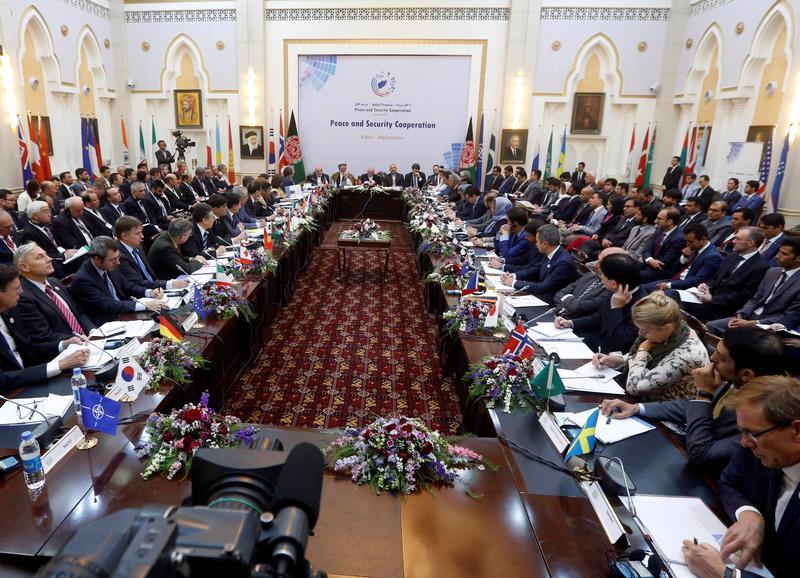Afghanistan Holds Regional Talks Over Deteriorating Security Situation, But Where Are The Women?
THE CITIZEN BUREAU

NEW DELHI: As the death toll from last week’s deadly attack outside the diplomatic quarters in Kabul climbed to 150 (with over 300 injured), Afghan President Ashraf Ghani led a regional conference that aimed to enlist neighbouring countries in the fight against terrorism.
The meeting, known as the Kabul Process, comes as Afghanistan sees a string of attacks and protests, with the latest being an attack in Herat on Tuesday itself. After the May 31 bombing in Kabul, the government fueled public anger as hundreds of protesters demanded the resignation of government officials. Tensions were exacerbated when the police fired into the crowd, killing nine.
In light of the deteriorating security situation in Afghanistan, Ghani appealed to representatives of the countries present at the meeting to cooperate with Kabul in combatting terrorism in the region. “We’re fighting 20 transnational terrorist groups on your behalf,” Ghani said. “What we need is an agreement on regional security.”
The countries present included Pakistan, India, Iran, Russia, China, Saudi Arabia, the US and various European countries, in front of whom Ghani accused Pakistan of waging an “undeclared war.”
Relations between Pakistan and Afghanistan have hit an all time low, with Kabul accusing Islamabad of aiding and abetting terrorism by providing shelter to the Taliban and Haqqani network. Pakistan denies the charge. Tensions between the two countries have spiralled over the issue, with Pakistan moving to restrict border crossings alleging that terror attacks within Pakistan are being carried out by terrorists who cross over from neighbouring Afghanistan.
Ghani also took a hit at western countries, chastising them for trying to negotiate directly with the Taliban. “There are too many players running too many parallel tracks with too little clarity on who they are and what they represent,” Ghani said. “We also ask that you respect the integrity of an Afghan-owned and led consolidated process and not set up separate tracks of your own.”
The strong words come as Russia steps up its influence in the region, reaching out directly to the Taliban leadership. Russian influence has been a sore point for both the Afghan and western leadership, with Afghan officials and US generals criticising Moscow for the same.
The Taliban, on its part, dismissed the Kabul Process as ‘futile.’ “Talks about peace during the presence of foreign invaders will not yield results and are meaningless,” the group said in a statement.
The talks come as the US contemplates sending additional troops to Afghanistan. The contemplation itself is an indication of the trouble in Afghanistan, as it indicates a massive failure of US policy in the region. Former US President Barack Obama had vowed to withdraw all foreign troops from Afghanistan, but repeatedly reneged on the commitment, with the original plan to withdraw all foreign troops by 2014 never being met. NATO currently has 13,000 troops in Afghanistan.
Notably absent from the Kabul Process were a key stakeholder -- namely, women. As a statement by Human Rights Watch reads, “the Kabul Process is already missing a crucial factor to a successful outcome. Research shows that full participation by women in peace negotiations increases the chances of a deal being reached and it being successful. Yet the “family photo” of the meeting participants, 47 Afghan and foreign dignitaries, included only two Afghan women.”
“In previous talks, Afghan women have sometimes been totally absent, sometimes been relegated to note-taking roles, and have never appeared in numbers sufficient to transcend tokenism. A long-promised plan by the Afghan government to implement UN Security Council Resolution 1325, which calls for women’s equal participation in issues surrounding peace and security, has been beset by delays and apathy.”
“The Kabul Process aims to bring together regional actors to support peace, and to put the Afghan government more clearly in charge than in prior efforts. But in the marginalization of women, the Kabul Process is already a continuation of earlier, unsuccessful, efforts.”
“This is a grave mistake for all Afghans who long for security. Last week, Afghan women died beside men in the bombing, and marched beside men in the protest. If peace is to come, they must also sit next to men at the negotiating table.”



